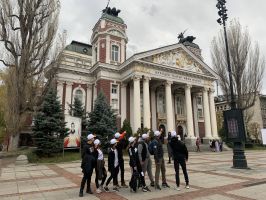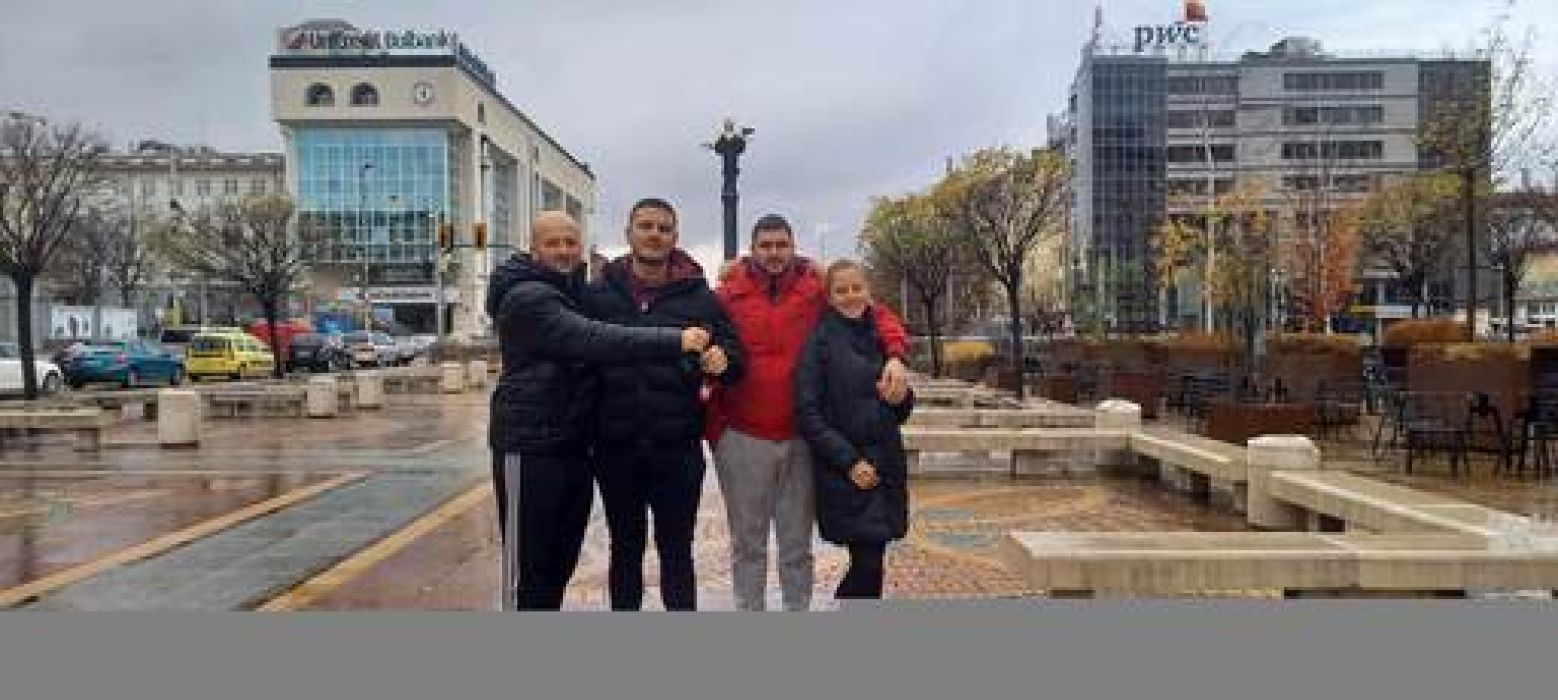NEWS

ORIENT SPORTS ORIENTEERING COMPETITION WAS HELD IN SOFIA


31.10.2022
On the 31st of October 2022, in the city center of Sofia, an orienteering competition for social inclusion was held. Participants were young people aged between 18 and 30 years old who were previously introduced to the participatory mapping method, which refers to community mapping that combines modern cartography with participatory methods to reflect and represent the spatial knowledge of local communities. The young people were divided into 5 teams of 6, each accompanied by a sports coach and a social worker. Each participant received an ORIENT kit with a set of sports orienteering tools developed specifically for the event by the project partners.
Within the ORIENT project, 5 national routes were developed in each partner country: Italy, Cyprus, Greece, Bulgaria and Bosnia and Herzegovina. They introduce the history, the cultural and natural heritage, and the uniqueness of each country by carefully selected "checkpoints" based on specific topics such as art, food, culture, religion or any other kind of tangible or intangible cultural heritage that is related to the social inclusion of young people.
The aim of the national route is to enable many young people to approach inclusion from different perspectives, taking into account the specific circumstances of each country. The national routes will also promote sport, mental health and human rights values by exploring the local natural and cultural environment through direct participation.
They were created by the project consortium together with teachers, sports coaches and young people.
The general objective of the project is to promote social inclusion of vulnerable young people by enhancing trainers and CSOs’ workers skills in using orienteering as a tool for strengthening social ties.
INTELLECTUAL OUTPUTS OF THE PROJECT:
1) Output number 1: ORIENT Anthology: a collection of inspiring good practices, tools and methodologies using orienteering for social inclusion- The anthology will provide evidence of the effectiveness of orienteering as a sport able to enhance social inclusion, while centralising in a single document a selection of interesting good practices, tools and methodologies which proved to be successful when working with vulnerable young people, taking care of their individual learning and social inclusion in a group setting;
2) Output number 2: ORIENT Curriculum: The ORIENT curriculum will have a two-level impact on the project targets: on the one hand, it will represent a complete training resource for sport trainers and CSOs’ workers, providing practical knowledge on how to promote orienteering-based activities to foster social inclusion and how to work with vulnerable young people;
3) Output number 3: GEARs & IDEAs: a toolbox for orienteering routes - The toolbox is expected to positively impact on the motivation of the vulnerable young people who will participate in the ORIENT activities, as it will provide them with a simple step-by-step guideline on the core elements they need to learn to play orienteering, combined with a kit of tangible materials made available for free and that can be re-use for practicing orienteering;
4) Output number 4: ORIENT Compendium “routes to inclusion”: The compendium will be a key element allowing to reiterate the experience made within the project and to inspire the arrangement of new local activities following the same route. It will serve the purpose of validating the effectiveness of the ORIENT approach, promoting its adoption by more and more sport and civil society organizations beyond the project lifetime;
5) Output number 5: ORIENT Manifesto: The output will ensure a better alignment in between the needs of the communities in the countries involved and the policy response at local level, especially in the field of sport initiatives fostering social inclusion.
ORIENT project is co-funded by the Erasmus+ programme of the European Union.
The aim of the national route is to enable many young people to approach inclusion from different perspectives, taking into account the specific circumstances of each country. The national routes will also promote sport, mental health and human rights values by exploring the local natural and cultural environment through direct participation.
They were created by the project consortium together with teachers, sports coaches and young people.
The general objective of the project is to promote social inclusion of vulnerable young people by enhancing trainers and CSOs’ workers skills in using orienteering as a tool for strengthening social ties.
INTELLECTUAL OUTPUTS OF THE PROJECT:
1) Output number 1: ORIENT Anthology: a collection of inspiring good practices, tools and methodologies using orienteering for social inclusion- The anthology will provide evidence of the effectiveness of orienteering as a sport able to enhance social inclusion, while centralising in a single document a selection of interesting good practices, tools and methodologies which proved to be successful when working with vulnerable young people, taking care of their individual learning and social inclusion in a group setting;
2) Output number 2: ORIENT Curriculum: The ORIENT curriculum will have a two-level impact on the project targets: on the one hand, it will represent a complete training resource for sport trainers and CSOs’ workers, providing practical knowledge on how to promote orienteering-based activities to foster social inclusion and how to work with vulnerable young people;
3) Output number 3: GEARs & IDEAs: a toolbox for orienteering routes - The toolbox is expected to positively impact on the motivation of the vulnerable young people who will participate in the ORIENT activities, as it will provide them with a simple step-by-step guideline on the core elements they need to learn to play orienteering, combined with a kit of tangible materials made available for free and that can be re-use for practicing orienteering;
4) Output number 4: ORIENT Compendium “routes to inclusion”: The compendium will be a key element allowing to reiterate the experience made within the project and to inspire the arrangement of new local activities following the same route. It will serve the purpose of validating the effectiveness of the ORIENT approach, promoting its adoption by more and more sport and civil society organizations beyond the project lifetime;
5) Output number 5: ORIENT Manifesto: The output will ensure a better alignment in between the needs of the communities in the countries involved and the policy response at local level, especially in the field of sport initiatives fostering social inclusion.
ORIENT project is co-funded by the Erasmus+ programme of the European Union.

 Български
Български


















































































































